知行英语综合教程1-Unit2
- 格式:ppt
- 大小:34.14 MB
- 文档页数:87
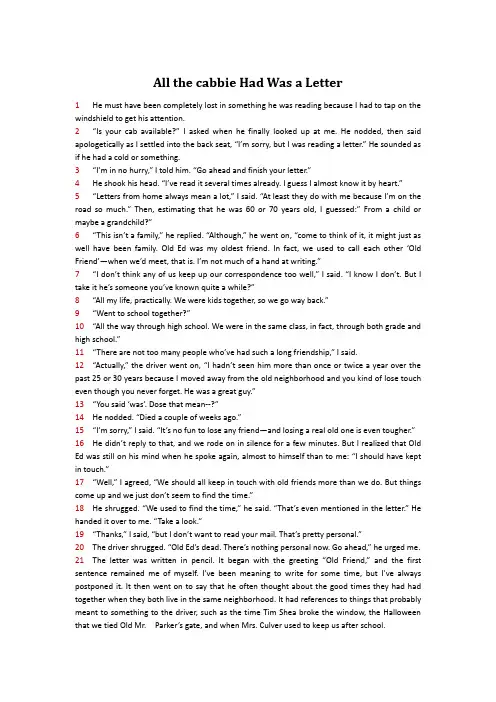
All the cabbie Had Was a Letter1He must have been completely lost in something he was reading because I had to tap on the windshield to get his attention.2“Is your cab available?” I asked when he finally looked up at me. He nodded, then said apologetically as I settled into the back seat, “I’m sorry, but I was reading a letter.” He sounded as if he had a cold or something.3“I’m in no hurry,” I told him. “Go ahead and finish your letter.”4He shook his head. “I’ve read it several times already. I guess I almost know it by heart.”5“Letters from home always mean a lot,” I said. “At least they do with me because I’m on the road so much.”Then, estimating that he was 60 or 70 years old, I guessed:”From a child or maybe a grandchild?”6“This isn’t a family,” he replied. “Although,” he went on, “come to think of it, it might just as well have been family. Old Ed was my oldest friend. In fact, we used to call each other ‘Old Friend’—when we’d meet, that is. I’m not much of a hand at writing.”7“I don’t think any of us keep up our correspondence too well,” I said. “I know I don’t. But I take it he’s someone you’ve known quite a while?”8“All my life, practically. We were kids together, so we go way back.”9“Went to school together?”10“All the way through high school. We were in the same class, in fact, through both grade and high school.”11“There are not too many people who’ve had such a long friendship,” I said.12“Actually,” the driver went on, “I hadn’t seen him more than once or twice a year over the past 25 or 30 years because I moved away from the old neighborhood and you kind of lose touch even though you never forget. He was a great guy.”13“You said ‘was’. Dose that mean--?”14He nodded. “Died a couple of weeks ago.”15“I’m sorry,” I said. “It’s no fun to lose any friend—and losing a real old one is even tougher.”16He didn’t reply to that, and we rode on in silence for a few minutes. But I realized that Old Ed was still on his mind when he spoke again, almost to himself than to me: “I should have kept in touch.”17“Well,” I agreed, “We should all keep in touch with old friends more than we do. But things come up and we just don’t seem to find the time.”18He shrugged. “We used to find the time,” he said. “That’s even mentioned in the letter.” He handed it over to me. “Take a look.”19“Thanks,” I said, “but I don’t want to read your mail. That’s pretty personal.”20The driver shrugged. “Old Ed’s dead. There’s nothing personal now. Go ahead,” he urged me. 21The letter was written in pencil. It began with the greeting “Old Friend,”and the first sentence remained me of myself. I’ve been meaning to write for some time, but I’ve always postponed it. It then went on to say that he often thought about the good times they had had together when they both live in the same neighborhood. It had references to things that probably meant to something to the driver, such as the time Tim Shea broke the window, the Halloween that we tied Old Mr. Parker’s gate, and when Mrs. Culver used to keep us after school.22“You must have spent a lot of time together,” I said to him.23“Like it says there,” he answered, “about all we have to spend in those days was time.” He shook his head: “Time.”24I thought the next paragraph of the letter was a little sad: I began the letter with “Old Friend”because that we’ve become over the years—old friends. And there aren’t many of us left.25“You know,”I said to him, “when it says here that there aren’t many of us left, that’s absolutely right. Every time I go to a class reunion, for example, there are fewer and fewer still around.”26“Time goes by,” the driver said.27“Did you two work at the same place?” I asked him.28“No, but we hung out on the same corner when we were single. And then, when we were married, we used to go to each other’s house every now and then. But for the last 20 or 30 years it’s been mostly just Christmas cards. Of course there’d be always be a note we’d each add to the cards—usually some news about our families, you know, what the kid was doing, who moved where, a new grandchild, things like that—but never a real letter or anything like that.”29“This is a good part here,” I said. “Where it says your friendship over the years has meant an awful lot to me, more than I can say because I’m not good at saying things like that.”I found myself nodding in agreement. “That must have made you feel good, didn’t it?”30The driver said something that I couldn’t understand because he seemed to be all choked up, so I continued: “I known I’d like to receive a letter like that from my oldest friend.”31We were getting close to our destination so I skipped to the last paragraph. So I thought you’d like to know that I was thinking of you. And it was signed, Your Old Friend, Tom.32I handed back the letter as we stopped at my hotel. “Enjoyed talking with you,” I said as I took my suitcase out of the cab. Tom? The letter was signed Tom?33“I thought your friend’s name was Ed,” I said. “Why did he sign it Tom?”34“The letter was not from Ed to me,”he explained. “I’m Tom. It’s a letter I wrote to him before I knew he’d died. So I never mailed it.”35He looked sort of sorrowful, or as if he were trying to see something in the distance. “I guessI should have writer it sooner.”36 When I got to my hotel room I didn’t unpack right away. First I had write a letter—and mail it.。
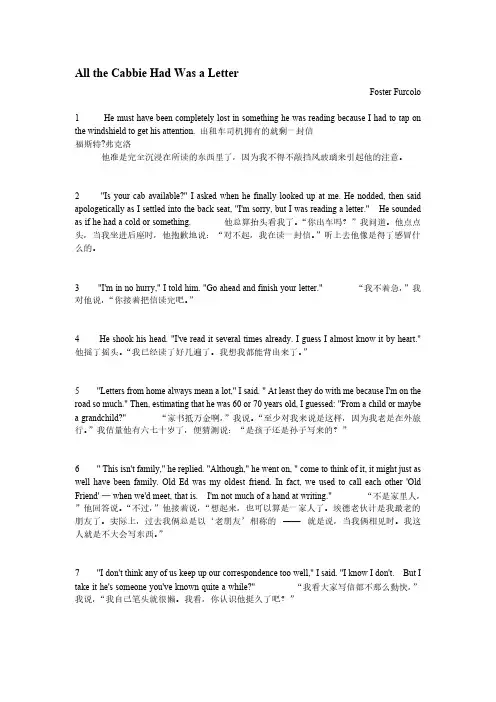
All the Cabbie Had Was a LetterFoster Furcolo1 He must have been completely lost in something he was reading because I had to tap on the windshield to get his attention. 出租车司机拥有的就剩一封信福斯特?弗克洛他准是完全沉浸在所读的东西里了,因为我不得不敲挡风玻璃来引起他的注意。
2 "Is your cab available?" I asked when he finally looked up at me. He nodded, then said apologetically as I settled into the back seat, "I'm sorry, but I was reading a letter." He soundedas if he had a cold or something. 他总算抬头看我了。
“你出车吗?”我问道。
他点点头,当我坐进后座时,他抱歉地说:“对不起,我在读一封信。
”听上去他像是得了感冒什么的。
3 "I'm in no hurry," I told him. "Go ahead and finish your letter." “我不着急,”我对他说,“你接着把信读完吧。
”4 He shook his head. "I've read it several times already. I guess I almost know it by heart." 他摇了摇头。
“我已经读了好几遍了。
我想我都能背出来了。
”5 "Letters from home always mean a lot," I said. " At least they do with me because I'm on the road so much." Then, estimating that he was 60 or 70 years old, I guessed: "From a child or maybea grandchild?" “家书抵万金啊,”我说。
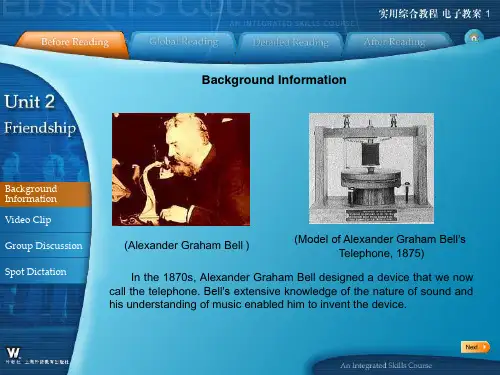
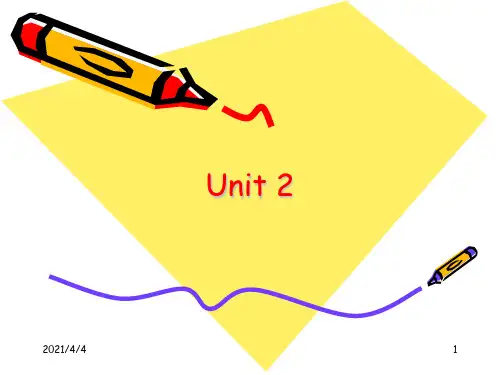

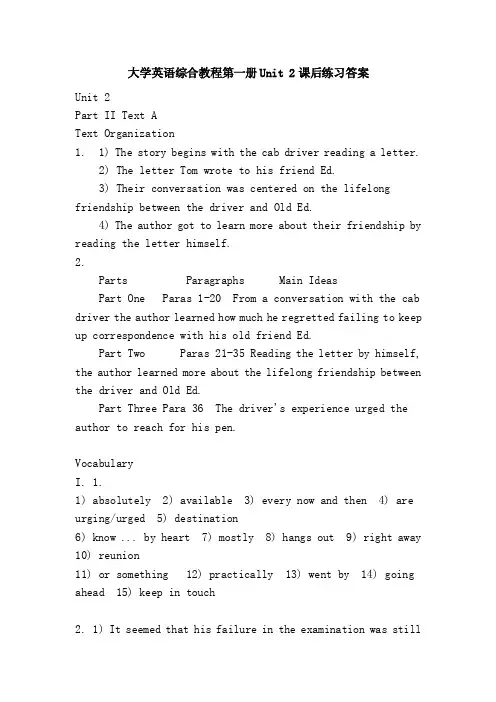
大学英语综合教程第一册Unit 2课后练习答案Unit 2Part II Text AText Organization1. 1) The story begins with the cab driver reading a letter.2) The letter Tom wrote to his friend Ed.3) Their conversation was centered on the lifelong friendship between the driver and Old Ed.4) The author got to learn more about their friendship by reading the letter himself.2.Parts Paragraphs Main IdeasPart One Paras 1-20 From a conversation with the cab driver the author learned how much he regretted failing to keep up correspondence with his old friend Ed.Part Two Paras 21-35 Reading the letter by himself, the author learned more about the lifelong friendship between the driver and Old Ed.Part Three Para 36 The driver's experience urged the author to reach for his pen.VocabularyI. 1.1) absolutely 2) available 3) every now and then 4) are urging/urged 5) destination6) know ... by heart 7) mostly 8) hangs out 9) right away10) reunion11) or something 12) practically 13) went by 14) going ahead 15) keep in touch2. 1) It seemed that his failure in the examination was stillon his mind.2) He was completely choked up by the sight of his team losing in the final minutes of the game.3) She was so lost in study that she forgot to have dinner.4) Something has come up and I am afraid I won't be able to accomplish the project on time.5) The cost of equipping the new hospital was estimated at $2 million.3. 1) A couple of flights at Pudong Airport were postponed this morning because of the awful weather. It is estimated that over one thousand passengers were held up.2) My professor assigned me some reference books on computers to read. Unfortunately they are not available in our school library. I am kind of worried about it.3) Michael is not much of a teacher. He often skips from one subject to another so it is difficult for his students to follow him. Besides he just lets them go ahead with exercises without making sure they have understood what they are expected to do. II. Collocation1. to2. for3. at4. from5. in6. to7. on8. withIII. Usage1. more or less2. kind of/sort of3. Something4. kind of/sort of5. more or less6. or somethingStructure1. 1) may/might as well watch2) may/might as well pour out3) may/might as well walk4) may/might as well buy2. 1) She looks as if she is worried about it.2) It smells as if it is fresh.3) It sounds as if it is Chinese.4) It feels as if it is made of silk.Comprehensive ExercisesI. Cloze(A) 1. choked up2. awful 3. practically4. neighborhood 5. correspondence6. available7. destination8. reunion9. Mostly 10. postponing11. absolutely(B)1. how2. himself3. but4. So5. to6. long7. reply/answer8. from9. asking 10. when11.touch 12. for 13. pieces 14. go 15. check 16. outII. TranslationIt is not easy to keep in touch with friends when they are far away. This is certainly true in my case.It has been a couple of years since I left my old neighborhood and all the friends I had there. I've been meaning to write to them but something or other comes up and I just don't seem to find the time. Now I have kind of lost touch with them. They are always on my mind, however, and I think I will certainly make an effort to keep up correspondence with them in future.Part III Text BComprehension Check1. d2. b3. a4. d5. c6. d7. dlanguage Practice1. stuff2. uneasy3. dragging4. highlight5. get rid of6. despair7. was peering/peered8.soaked9. swung 10. ingood shape11. extent 12. rescue 13. draw on 14. let... down 15. Worse still。
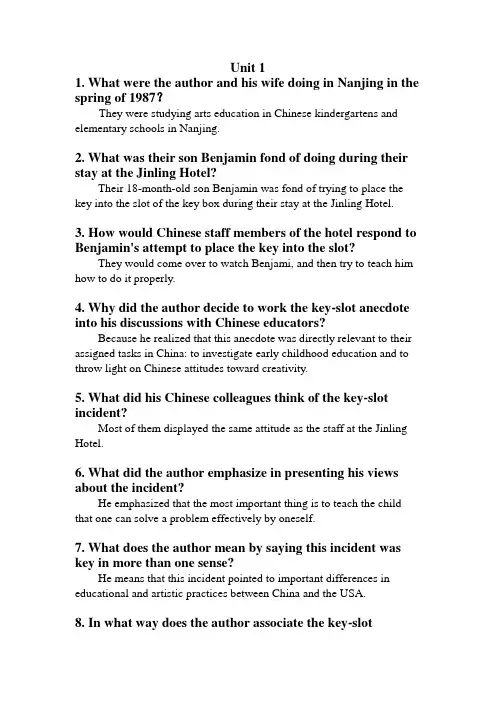
Unit 11. What were the author and his wife doing in Nanjing in the spring of 1987?They were studying arts education in Chinese kindergartens and elementary schools in Nanjing.2. What was their son Benjamin fond of doing during their stay at the Jinling Hotel?Their 18-month-old son Benjamin was fond of trying to place the key into the slot of the key box during their stay at the Jinling Hotel.3. How would Chinese staff members of the hotel respond to Benjamin's attempt to place the key into the slot?They would come over to watch Benjami, and then try to teach him how to do it properly.4. Why did the author decide to work the key-slot anecdote into his discussions with Chinese educators?Because he realized that this anecdote was directly relevant to their assigned tasks in China: to investigate early childhood education and to throw light on Chinese attitudes toward creativity.5. What did his Chinese colleagues think of the key-slot incident?Most of them displayed the same attitude as the staff at the Jinling Hotel.6. What did the author emphasize in presenting his views about the incident?He emphasized that the most important thing is to teach the child that one can solve a problem effectively by oneself.7. What does the author mean by saying this incident was key in more than one sense?He means that this incident pointed to important differences in educational and artistic practices between China and the USA.8. In what way does the author associate the key-slotincident with "teaching by holding his hand"?The manner in which the Chinese staff saw the need to teach the child by guiding his hand is characteristic of a broader attitude to education, one that stands in contrast to the Western preference for leaving the child to explore and learn unaided.9. What examples does the author give to illustrate childhood education in the arts in China?One example is of children at the age of 5 or 6 painting flowers, fish and animals skillfully and confidently; in a second example, calligraphers 9 and t 0 years old are producing excellent works; and in a third, young artists work on perfecting their: craft for several hours a day.10. How do Americans and Chinese differ in their attitudes to creativity?Americans think that unless creativity has been acquired early, it may never emerge, and skills can be picked up later. Chinese think that if skills are not acquired early, they may never be acquired, and there is no hurry to promote creativity.11. What makes them take different positions on the question of creativity?This is mainly due to the difference in their way of thinking.12. What suggestion does the author make about seeking a better approach to fostering skills and creativity?The author makes the suggestion that we should strike a better balance between the poles of creativity and basic skills.Unit21. What is the Salvation Army? What does a Salvation Army bell ringer do?The Salvation Army is a religious charitable organization. A Salvation Army bell ringer is a volunteer who helps it collect donations.2. What did the boy ask the writer? What do you think made him raise such a question?The boy asked him: Are you poor? He did it simply out of confusionand curiosity. Obviously he knew nothing about the Salvation Army bell ringer.3. How did the writer answer? What does the writer's answer to the boy's question mean?He said, "I have more than some people, but not as much as others." This means that he was neither poor nor rich.4. Why did the boy's mother scold him?The boy's mother scolded him because the question was socially inappropriate, especially to a person who looked poor.5. Is the writer poor or not in terms of material possessions? Give facts to support your conclusion.H's, economically he is poor. He lives in a small basement apartment. He doesn't even have a color TV. He falls into the lowest income category And so on.6. Does the writer feel poor? Why or why not?No, the writer does not feel poor. This is because he has enjoyed good health and creativity which he thinks are much more important than material goods.7. In what situation does the writer feel out of place?He feels out of place among people who ate primarily interested in material things.8. What did the girl tell him before her visit to his basement apartment? And what happened after?She told him that she was interested in what's on the inside. But after he Wok her to his poorly furnished apartment, she changed her mind completely.9. How ought one to understand such "a seemingly abrupt change in her priorities"?It only shows that to her the most important thing was still material goods rather than what she had claimed before.10. Can we infer from the essay what role commercials can play in society?Commercials can put people under pressure to purchase more than is really necessary.11. Why does the writer say "December is the time of year I feel wealthiest"?Because December is the time for him to work for the Salvation Army as a bell ringer, which gives him a genuine sense of belonging and brings him happiness in helping others.12. How has the boy's question affected the writer?The boy's question has helped the writer realize that, despite his lack of expensive possessions, he is rich in many other ways and should be thankful for that.Unit41. What did the author do three years ago and what is she doing now?She was a television producer three years ago and now she works as a telecommuter.2. How does the author work nowadays?She submits articles and edits them via emails and communicates with colleagues on Internet mailing lists.3. How does the author manage her daily life?She could almost do anything on the net: she can order food, and manage her money, love and work.4. What are the symptoms shared by people who live a virtual life?They are separated from the real world and don’t like to communicate with people face to face.5. What is the Net critics’ worst nightmare?The situation in which people who are hooked on the net find themselves feeling an aversion to outside forms of socializing.6. How does the author behave when she is suddenly confronted with real live humans?She gets overexcited and speaks too much and interrupts.7. How does the author behave on line? Why?She is bad-tempered and easily angered and finds herself attacking everyone in sight.8. How does virtual life affect her relationship with her boyfriends?She often misinterprets his boy friend’s intensions because of the lack of emotional cues given by their typed dialogue, which leads to a quarrel.9. According to the author, why are co-workers important toa human being?Because a human being relied on co-workers for company.10. What does the author do to restore balance to her life? She forced herself back to the world: she arranges anything to get her out of the house and connected with others.11. Does the author feel happy when she returns to the real world? Why or why not?No, because she finds being face to face sometimes unbearable.12. What does she do then?She returned to the virtual world.Unit51. Because the pole was set at 17 feet which was three inches higher than his personal best.2. Because pole-vaulting combines the grace of a gymnast with the strength of a body builder.3. His childhood dream was to fly. His mother read him numerous stories about flying when he was growing up.4. Because he believed in hard work and sweat. His motto: If you want something, work for it!5. Michael's mother wished he could relax a bit more and be that "free dreaming" little boy. On one occasion she attempted to talk to him and his father about this, but his dad quickly interrupted, smiled and said, "You want something, work for it!"6. He began a very careful training program.7. He seemed unaware of the fact that he had just beaten his personal best by three inches. He was very calm.8. He began to feel nervous when the bar was set at nine inches higher than his personal best.9. What his mother had taught him about how to deal with tension or anxiety helped him overcome his nervousness.10. The singing of some distant birds in flight made him associate his final jump with his childhood dream.11. He could imagine the smile on his mother’s f ace. He thought his father was probably smiling too, even laughing. However, in fact, his father hugged his wife and cried like a baby in her arms.12. Because he was blind.Unit61. They liked girly toys such as a miniature kitchen, and Barbies.2. To convert a gas-guzzling SUV into a hybrid electric vehicle.3. Because she didn’t know anything about cars and was afraid of being cheated by the mechanic.4. She was craving independence and wanted to live away from home forsome time.5. It helped her earn six engineering credits, which of course made it easier for her to become an engineering major.6. Five years.7. In her view, if you find a subject is difficult to learn, it does not mean you’re not good at it. It just means you have to set your mind and work harder to get good at it.8. Because he had confidence in her abilities believing she could have done better if she had studied more.9. No, she wasn’t always confident. She had moments of panic, worried that as a woman she would be unable to understand thermodynamics.10. She considers it wrong because it is based on a faulty premise.11. It is flexible and more powerful than we imagine.12. What she means is not to accept others’ opinions blindly but to use one’s own judgment.Unit 71. It has borrowed and is still borrowing massively from other languages. Today it has an estimated vocabulary of over one million words.2. They don’t like borrowing foreign words. They try to ban words from English.3. Old English or Anglo-Saxon English.4. The Germanic tribes brought it to the British Isles in the 5th century.5. They are usually short and direct.6. They use words derived from Old English.7. An English judge in India noticed that several words in Sanskrit closely resembled some words in Greek and Latin. A systematic study later revealed the Indo-European parent language.8. Greek, Latin, Sanskrit, English, etc.9. There were three languages competing for use in England.10. Words from Greek and Roman classics came into the English language.11. The great principles of freedom and rights of man were born in England, then the Americans carried them forward.12. No. English is and has always been the tongue of the common people. There should not be any fence around it to protect its so-called purity.。

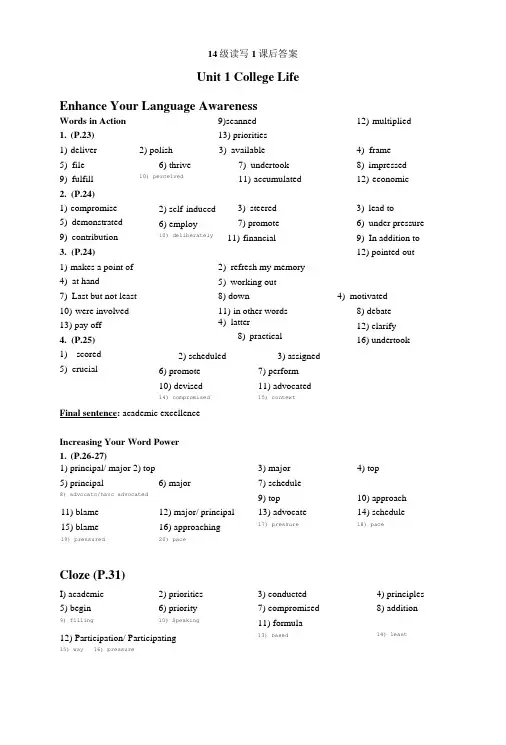
2) polish6) thrive10) perceived2) sclf-induccd6) employ10) deliberately2) scheduled 6) promote10) devised14) compromised3) assigned 7) perform 11) advocated 15) context1) principal/ major 2) top5) principal 6) major 8) advocatc/havc advocated11) blame 15) blame 19) pressured 12) major/ principal16) approaching20) pace3) major7) schedule9) top13) advocate17) pressure4) top10) approach14) schedule18) paceI) academic5) begin9) filling 2) priorities 6) priority 10) Speaking12) Participation/ Participating 15) way 16) pressure3) conducted7) compromised11) formula13) based4) principles8) addition14) least14级读写1课后答案Unit 1 College LifeEnhance Your Language AwarenessWords in Action 1.(P.23)1)deliver5)file9)fulfill2.(P.24)1)compromise5)demonstrated 9)contribution3.(P.24)1)makes a point of 4)at hand7)Last but not least 10)were involved 13) pay off4.(P.25)1)scored5)crucial 9)scanned13) priorities3)available7)undertook11)accumulated3)steered7) promote11)financial2)refresh my memory5)working out8) down11) in other words4)latter8)practical12)multiplied4)frame8)impressed12)economic3)lead to6)under pressure9)In addition to12) pointed out4)motivated8) debate12) clarify16) undertookFinal sentence: academic excellenceIncreasing Your Word Power1.(P.26-27)Cloze (P.31)Words in Action (P.54) 1. (P.54) 1) assume 4) equivalents 8) qualified 12) solemnly 2. (P.54) 1) obtain 5) relevant 9) means 12) characters 3. (P.55) 1) fond of4) To a certain extent 7) rid...of 10) at all 13) in his hurry16)was worth2) argued 5) individual 9) adventure s2) confident 6) helpful 10) process13) astonished 2) related to 5) vice versa 8) cleared up 11) sure enoughIt's no use3) claim 6) personal 10) furthermore3) communicate 7) extreme 11) particularly14) apparently7) precise 11) intelligent4) advantageenjoyable3) find out 6) no doubt 9) or else 12) let alone15) in my view1) doubt 5) afford 9) extent13) becauseTranslation (P.31 〜P ・32)1) . The judge asked the reporter not to disclose the name of the victim. 2) . The teacher took pains to make sure that we all understood what he said.3) . Recently the school conducted a survey among those students who have attained academic excellence.4) . He said he would accept the job, so wc have asked him to confirm his acceptance by writing us a letter.5) . George studies very hard. He wanted to make the most of his chance to learn. 6) . We can't go. To begin with, it's too cold. Besides, we're busy. 7) . It's about time that someone spoke up for these basic truths/ facts.8) . You should be working instead of lying there in bed at this time of the year. 9) . DI jot down some notes while he's speaking. 10) . I can't carry the suitcase on my own; it's too heavy.Unit 2 Learning a LanguageEnhance Your Language AwarenessCloze (P.59)2) efficient6) claim 10) ridiculous14) individualWords in Action 1.(P.82)1) spot 2) create 3) rare 5) ease 6) inquiry 7 )preachin g9) shallow 10) wrapped2.(P.83)1) awkward 2) relief 3) occur 5) disturbing 6) released 7) pausing 9) swallowed 10) wipe 11) treat13) astonished 14) apparently3. (P.84)1) become well acquainted with 2) took us by surprise turned out 5) fight back 7)ran away8) take care of 9) hemmed and hawed 10)turned into 11) keep...from12) soaking up4) indicated 8)seek4) options 8) scattered 12) recall3)gathcr our thoughts4)6) hang up on3)focus 7) visits; visited11) matchTranslation (P.60)1) . The baby cannot even crawl yet, let alone walk.2) . Will claimed he was dining with a group of friends at the time of the murder, but in my opinion he told a lie.3) . To a certain extent, the speed of reading is closely related to reading skills; and with reading skills you can cope with outside reading better.4) .Can you take a look at the engine to see what's wrong?5) . Some people assume that there is a Chinese equivalent for every Japanese word. 6) . We have passed all relevant information on to the police.7) . There is no use asking me any more questions about that matter because I won't answer. 8) . You should be working instead of lying there in bed at this time of the year. 9) . They refused to provide us with all the information we need. 10) . This accident is very similar to the one that happened three years ago. 11) . The film is based on a play by Shakespeare.Unit 3 Parents and ChildrenEnhance Your Language AwarenessIncreasing Your Word Power 2. (P.85~P.86)1)focus 5) fears 9) chat 13) match 2) fears6) attacks 10) touch 14) fearCloze (P.88)1)recent 2) surprise 3) sad/solemn 4) keeping5) disturbing 6) inquiries 7) admitted 8) occurred9)surgery 10) options 11) tightly 12) soaking13)scent 14)gatherings14)Translation (P.89)1)We are good friends; however, he kept such an important matter from me, which took me by surprise.2)At the commencement, she felt a lump in her throat but fought back her tears.3)Tom chatted with me last night. He told me that his disease had been brought under control, and there was no need for surgery.4)Her parents were worried sick when they knew that she had run off the highway.5)She looks very worried; I wonder what's on her mind.6)He is a shy and silent by. Before he went onto the stage to share his experiences, he sat quietly in a corner of the auditorium, gathering his thoughts.7)After several years of working in a band, he has now gone back to being a solo musician, so his career has come full circle.8)To his relief his son has turned into a capable businessman.Unit 4 Growing UpEnhance Your Language Awareness1( P.114)1) beamed 2) celebrate 3) complaining 4) enrolled5) panicked 6) protested 7) stubborn 8) ambitious9) figures 10) frustrated 11) possessive 12) restless2( P.114-P.115)1) conflict 2) overcame 3) have survived 4) attend5) frowned 6) wander 7) guilty 8) sustained9)survey 10) terrified 11) insurance 12)Adapting3.(P.115〜P.116)1) was sick of 2) choking back 3) Compared with4) settled into 5) would give anything/ the world 6) in the midst of7) in his own right 8) worked out 9) fit in with10) grew apart 11) No wonder 12) staying13) was annoyed with 14) was scared of 15) in trouble16) For instanceCloze (P. 120)1) beamed 2) honorable 3) awkward 4) protested5) complaints 6) compliments 7) stubborn 8) frowned9) recall 10) panicked 11)insurance 12) surveyed13) groaning 14) recognitionTranslation (P.121)1)Many teachers frowned on this practice.2)An old man glared at me when I was trying to cut across the lawn.3)When I mentioned my father, she showed a smile of recognition on her face.4)My firstborn was quite obedient, whereas my younger child was very stubborn. I can still recall now how the younger child insisted on going abroad to study after he finished his secondary school.5)Countries in South Asia sustained great losses when the tsunami struck the area.6)Every time the mother tries to compare the younger brother with his elder brother, the younger one will protest.7)He found himself unable to fit in with his classmates when he first came to this school.8)The fury on her face terrified me. I dared not say no to her again.9)No wonder you ended up in trouble. You never followed your parents' advice.10)It took him two years to adapt to the new environment.。
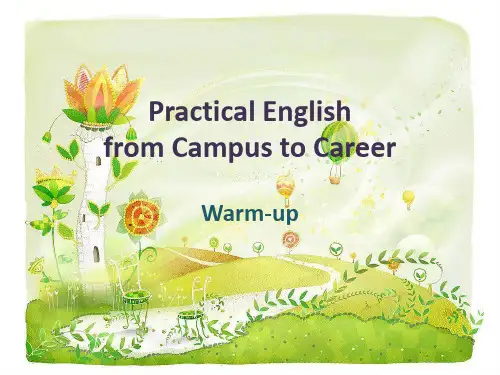

知行英语综合教程1unit1答案Unit 1 Growing UpPart II Language FocusVocabularyⅠ.respectable2. agony3. put…down4. sequence5. hold back6. distribute7. off and on8. vivid9. associate10. finally11. turn in12. tackle21. has been assigned to the newspaper’s Paris office.2. was so extraordinary that I didn’t know whether to believe him or not.3. a clear image of how she would look in twenty years’time.4. gave the command the soldiers opened fire.5. buying bikes we’ll keep turning them out.3.1. reputation, rigid, to inspire2. and tedious, What’s more, out of date ideas3. compose, career, avoid showing, hardly hold backⅡ.1. composed2. severe3. agony4. extraordinary5. recall6. command7. was violating 8. anticipateⅢ. 1. at 2. for 3. of 4. with 5. as6. about7. to8. in, in 9. from 10. on/uponComprehensive ExercisesⅠ. Cloze1.1.hold back2. tedious3. scanned4. recall5. vivid6.off and on 7. turn out/in 8. career2.st2. surprise3. pulled4. blowing5.dressed6. scene7. extraordinary2.8 image 9. turn 10.excitementⅡ. Translation1.1. As it was a formal dinner party, I wore formal dress, as Mother told me to.2. His girlfriend advised him to get out of/get rid of his bad habit of smoking before it took hold.3. Anticipating that the demand for electricity will be high during the next few months, they have decided to increase its production.4. It is said that Bill has been fired for continually violating the company’s safety rules. /Bill is said to have been fired for continually violating the company’s safety rules.5. It is reported that the government has taken proper measures to avoid the possibility of a severe water shortage. /The local government is reported to have taken proper measures to avoid the possibility of a severe water shortage.2.Susan lost her legs because of / in a car accident. For a time, she didn’t know how to face up to the fact that she would never (be able to) walk again.One day, while scanning (through) some magazines, a true story caught her eye /she was attracted by a true story. It gave a vivid description of how a disabled girl became a writer. Greatly inspired, Susan began to feel that she, too, would finally be bale to lead a useful life.。
知行英语综合教程1unit2答案Unit 2 FriendshipI. Vocabulary1. Fill in the gaps with words or phrases given in the box.1) absolutely2) available3) every now and then4) are urging/ urged5) destination6) mostly7) hangs out8) right away9) reunion10) or something11) estimate12) going ahead2. Rewriting1) It seemed that his failure in the examination was still on his mind.2) He was completely choked up by the sight of his team losing in the final minutes of the game.3) She was so lost in study that she forgot to have dinner.4) Something has come up and I am afraid I won’t be able to accomplish the project on time.5) The cost of equipping the new hospital was estimated at $2 million.3. Complete the sentences.1) were postponed the awful is estimated2) reference not available an kind of3) not much of a teacher skips go aheadII. Collocation1. to2. for3. at4. from5. in6. to on7. on8. withIII. Usage1. more or less2. kind of/ sort of3.something4. kind of/ sort of5. more or less6. or something Comprehensive exercisesI. Cloze1. text-related1) choked up 2) awful 3) practically 4) neighborhood5) correspondence 6) available 7) destination8) reunion 9) Mostly 10) postponing 11) absolutely2. Theme-related1) how 2) savings 3) embarrassment 4) phone 5) interrupted6) touch 7) envelop 8) signed 9) message 10) neededII. Translation1. Translate the sentences.1) Half an hour had gone by, but the last bus hadn’t come yet. We had to walk home.2) Mary seems to be very worried about the Chinese exam because she hasn’t learned the texts by heart.3) Since the basketball match has been postponed, we might as well visit the museum.4) He stayed in Australia with his parents all the way through WWⅡ.5) Since I graduated from Nanjing University in 1985, I have kind of lost touch with my classmates.2. Translate the passage.It is not easy to keep in touch with friends far away. This is true in my case.It has been a couple of years since I left my old neighborhood and all the friends there. I have been meaning to write to them but things come up and I just don’t seem to find the time. They are always on my mind, however, and I think I will certainly make an effort to keep up correspondence with them in the future.。